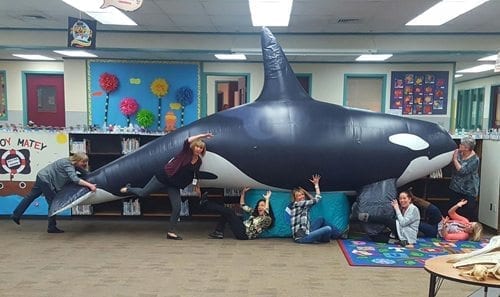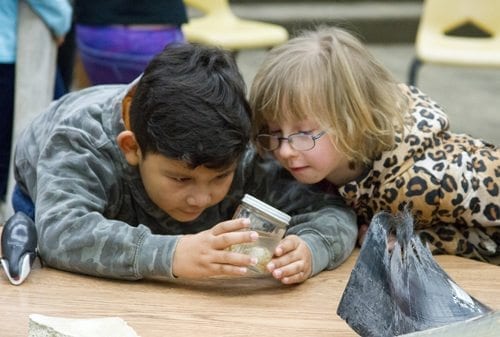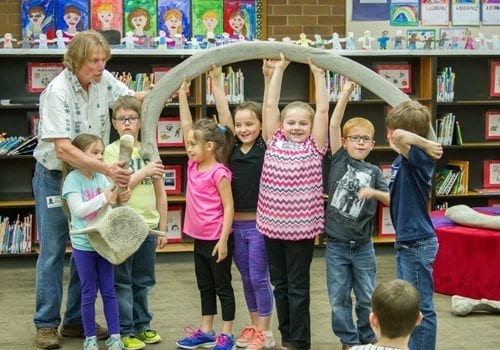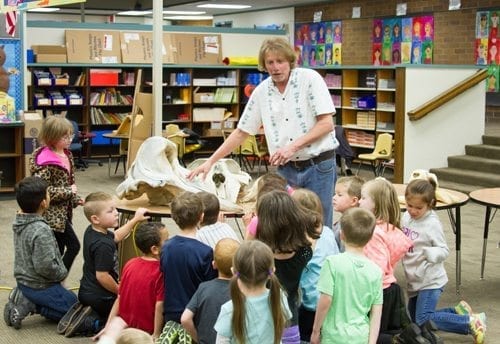WOODLAND — The staff at Woodland Primary School uses teamwork, data analysis, and planned engaging events to involve all students in their own learning, offering support for struggling students and challenges for students who excel at their learning.
In order to collect information on where students need assistance or additional challenges, the teaching staff uses an assessment software package designed specifically for the task called iReady.
“We now have multiple data sources for our kindergarteners and first graders to identify their strengths and weaknesses in different subject areas and skills,” explained Woodland Primary School Principal Ingrid Colvard. “We always knew many students were missing necessary skills, but thanks to the data analysis, we now know exactly what areas to target.”

The teaching team designed extension periods when 16 adults divide the entire school’s students into small groups to address each group’s specific needs.
“Whether they may be struggling in need of fundamental support or excelling and needing accelerated challenge, this approach allows teachers to better meet students’ needs,” said Colvard. “This way, all of our kids are having their specific needs met.”
By offering extension time involving all students, kindergarteners now have the opportunity to work with their first-grade counterparts.
“By the end of kindergarten, our kids should move on to the next grade as emergent readers,” said Colvard. “By the end of first grade, we want our students reading at their grade level or higher, so if we have a kindergartener who’s excelling, why not offer them additional challenge at the higher grade’s reading level?”

Teachers use these innovative approaches to help increase student learning throughout their classes. Using different strategies such as Project GLAD (Guided Language Acquisition Design), teachers offer students opportunities such as performing group research projects.
“One of the biggest differences from more traditional approaches is how students read texts far above their grade level for their research,” explained Heather Boop, a first grade teacher. “The opportunities have extended beyond first grade with accelerated kindergarten students having the chance to join first grade classes for different projects.”

The teaching teams identified the various extension groups by analyzing data and observing student results first-hand.
“We realized we needed more challenging activities to enhance and improve student learning, so the staff works as a team to develop these new ideas,” said Boop. “Students are incredibly excited to take on more challenging activities because these activities also offer them the chance to choose topics that interest them the most.”
The staff at Woodland Primary School also uses engaging events to enhance course curriculum and improve student learning. John L. Ford, a marine biologist and whale researcher, makes annual visits to the primary school to teach students about whale biology and marine life. This April marked 33 years of his visits. He brings bones, fossils, models, and a life-size inflatable whale for students to see and touch as part of his presentations.

“I try to make my presentations as fun as possible so the students can develop a connection to the material and continue their learning as they grow older regardless of what their passion may be,” said Ford. “I love seeing the reaction and excitement in their eyes.”
Student volunteers held up whale bones to demonstrate the sheer size of a blue whale. Ford also taught the students water safety and the importance of respecting sea life by staying away from sea lions on beaches who might look cute, but whose powerful jaws and teeth can cause serious injuries.
The teaching staff uses Ford’s visit as the basis to develop special projects for their courses, feeding material into reading, writing, science, and mathematics. Following Ford’s visit, students became experts on their own sea animal, selecting an animal which interested them the most, and conducting a research project on it including writing a paper and presenting to the class.
“The project teaches public speaking skills as well as how students can learn from one another, not just their teacher,” explained Amy Rich, a first grade teacher. “Having schoolwide events like John’s visit help breathe life into standards-based learning.”
In addition to their research projects, students created whale models and artwork using geometry to design seascapes from triangles, polygons, and other geometric shape. They also learned how to accurately label parts of models using scientific methodology.
Information provided by Woodland Public Schools.




